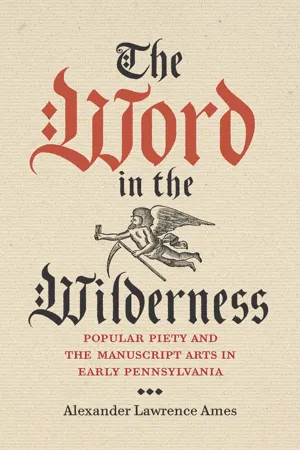
Pietist, Moravian, and Anabaptist Studies
Popular Piety and the Manuscript Arts in Early Pennsylvania
- English
- PDF
- Available on iOS & Android
Pietist, Moravian, and Anabaptist Studies
Popular Piety and the Manuscript Arts in Early Pennsylvania
About This Book
Once a vibrant part of religious life for many Pennsylvania Germans in the eighteenth and nineteenth centuries, Fraktur manuscripts today are primarily studied for their decorative qualities. The Word in the Wilderness takes a different view, probing these documents for what they tell us about the lived religious experiences of the Protestant communities that made and used them and opening avenues for reinterpretation of this well-known, if little understood, set of cultural artifacts.
The resplendent illuminated religious manuscripts commonly known as Fraktur have captivated collectors and scholars for generations. Yet fundamental questions about their cultural origins, purpose, and historical significance remain. Alexander Lawrence Ames addresses these by placing Fraktur manuscripts within a "Pietist paradigm, " grounded in an understanding of how their makers viewed "the Word, " or scripture. His analysis combines a sweeping overview of Protestant Christian religious movements in Europe and early America with close analysis of key Pennsylvania devotional manuscripts, revealing novel insights into the religious utility of calligraphy, manuscript illumination, and devotional reading as Protestant spiritual enterprises. Situating the manuscripts in the context of transatlantic religious history, early American spirituality, material culture studies, and the history of book and manuscript production, Ames challenges long-held approaches to Pennsylvania German studies and urges scholars to engage with these texts and with their makers and users on their own terms.
Featuring dozens of illustrations, this lively, engaging book will appeal to Fraktur scholars and enthusiasts, historians of early America, and anyone interested in the material culture and spiritual practices of the German-speaking residents of Pennsylvania.
Frequently asked questions
Information
Table of contents
- COVER front
- Series Page
- Copyright Page
- Table of Contents
- List of Illustrations
- Preface: "The Quill is My Plow"
- Notes to Preface
- Acknowledgments
- Introduction
- Notes to Introduction
- Chapter 1: "Heaven is My Fatherland"
- Notes to Chapter 1
- Chapter 2: "The Spirit of the Letter"
- Notes to Chapter 2
- Chapter 3: "Worship Always the Scripture"
- Notes to Chapter 3
- Chapter 4: "Incense Hill"
- Notes to Chapter 4
- Chapter 5: Marching to "Step and Time"
- Notes to Chapter 5
- Conclusion
- Notes to Conclusion
- Notes
- Bibliography
- Index